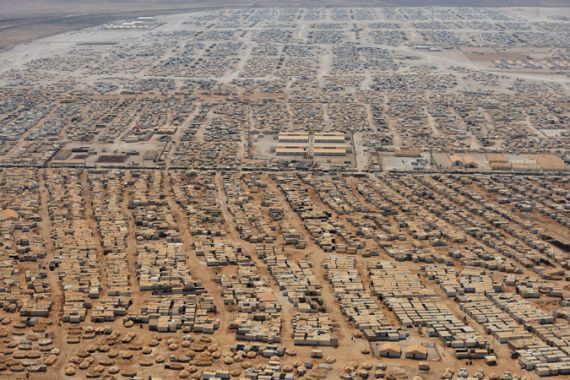Syrian refugees adapt to Jordan legal system
Syrian Lawyers’ Initiative trains advocates in Jordanian law so that refugees can marry, work and live more easily.

Amman, Jordan – Thirty-two Syrians cluster around the conference tables of a hotel in Amman, Jordan. They are smartly dressed, foreheads crinkled, scribbling furiously on notepads as one man clears his throat at the front of the room.
“Suppose that Zaatari camp residents Rana and Fadi are married in secret, with a sheikh’s approval – but they do not tell their families or have any kind of civil contract. Is this marriage legitimate or not?” The speaker, Jordanian lawyer Abdullah al Hroub, waits for the Syrians’ response.
Chatter ripples through the room. The 32 Syrians – who include 31 men and just one woman – are all lawyers, many of whom practiced for decades before the war forced them out of their country. Now they are lawyer-refugees, spread throughout Jordan and restricted from employment in general, let alone continuing their legal careers.
More than 570,000 Syrians are currently refugees in Jordan, according to UNHCR registration numbers. They first came when the Syrian revolution began in 2011, streaming and then flooding into Zaatari, which hosts more than 101,000 refugees – making it the fourth-largest city in Jordan. Three years into the war, camp residents have exchanged their tents for metal caravans. Initial concerns of finding food, water, a place to sleep and escape from death have been replaced by thoughts of family, work and long-term survival. Meanwhile, more than 80 percent of Syrian refugees live outside the camps, spilling into Jordanian cities that they once considered temporary shelters but now reluctantly call home.
|
|
| UN: Syrian refugee numbers cross two million |
Law has become critical in this context: Two communities, refugee and host, must now coexist on Jordanian land. Jordanians cannot pretend that Syrians will soon leave, nor can Syrians set up a parallel legal system in Jordan. Stability requires accommodation and cooperation from both.
On this morning, February 9, the Syrian group snaps alive with discussion. What role does civil recognition play in the case study? Is the sheikh’s approval enough? This marriage wouldn’t stand in Syria, which means consequent children would be considered illegitimate and deprived of their rights. Do the same rules apply in Jordan?
The lawyers are part of the Syrian Lawyers’ Initiative (SLI), a programme run by Jordanian nonprofit ARDD-Legal Aid under government approval and in partnership with Oxfam. Since November 2013, the cohort has completed three phases of training on civil society, human rights, psychosocial support and Jordanian law.
One session focused on Jordanian labour laws, addressing the employment system that many refugees struggle with but do not understand. Another targeted trauma and therapy, teaching the lawyers how to integrate psychosocial care with legal advising. The last workshop highlighted family and marriage laws, under the Syrians’ specific request.
“Our people need legal help, especially women. There are hundreds of marriages without formal court approval in the camps,” said 40-year-old Ahmad*, who practiced law for 23 years in Daraa before coming to Amman last year. Informal refugee marriages seemed inconsequential at first, Ahmad said. Camp residents were fresh from the war, gasping for survival, their worlds fallen apart. Why begrudge them marriage, even if technically illegal?
But over time, problems surfaced. Without official marriage records, women have no protection or support if their husbands die, abandon or abuse them. Divorce is impossible, since they have never formally married, and their children are considered bastards. Family, the very building block of civil society, loses legitimacy, threatening to take the region’s kinship-based social system down with it. Things get even more complicated when Syrians marry Jordanians, Saudis or other nationalities, again with no legal recognition or guarantee.
At this point, lawyers decided to step in. SLI intentionally emphasises capacity building, not relief, said ARDD-Legal Aid project officer Louise Julin. “We equip Syrians so they can strengthen their own community, where they already have the other refugees’ trust,“ she said. “Then they can not only protect their community here, but also help build Syrian civil society in the future.“
Information empowers, said 43-year-old Mahmoud*, who came to Jordan in January 2013 and now lives in Zaatari. “There are half a million Syrians in Jordan. They want to marry, work, and just live, but do so in ways that remove their rights,” he said. “To advise them, we must learn about the Jordanian law and processes.” Even if the lawyers cannot practice or implement contracts under Jordanian law, at least they can now provide sound legal advice.
The final phase of SLI sends these lawyers back to their camps and cities, where they will survey the Syrian community for its most pressing legal needs. Some have become clear already – labour and personal status laws, for example. Other results will be reported back for future workshops.
ARDD-Legal Aid Director Samar Muhareb quoted one Syrian lawyer’s words from SLI’s initial session: “The future of Syria lives in the rule of law.” Out of more than half a million Syrians in Jordan, this group banded together in the belief that their future must be built on a solid legal ground, Muhareb said. As the war drags on, she said, host communities should also encourage Syrian refugees to respect Jordanian law – for their survival as refugees, but also for the peace of Jordan and Syria, both now and in the future.
“These lawyers are our colleagues. We hope to see them one day in Syria’s own legal aid offices,” Muhareb said. “Stability for the law means stability for Syria, whenever that day comes.”
*Syrian interviewees’ names changed for protection.
Follow Alice Su on Twitter: @aliceysu